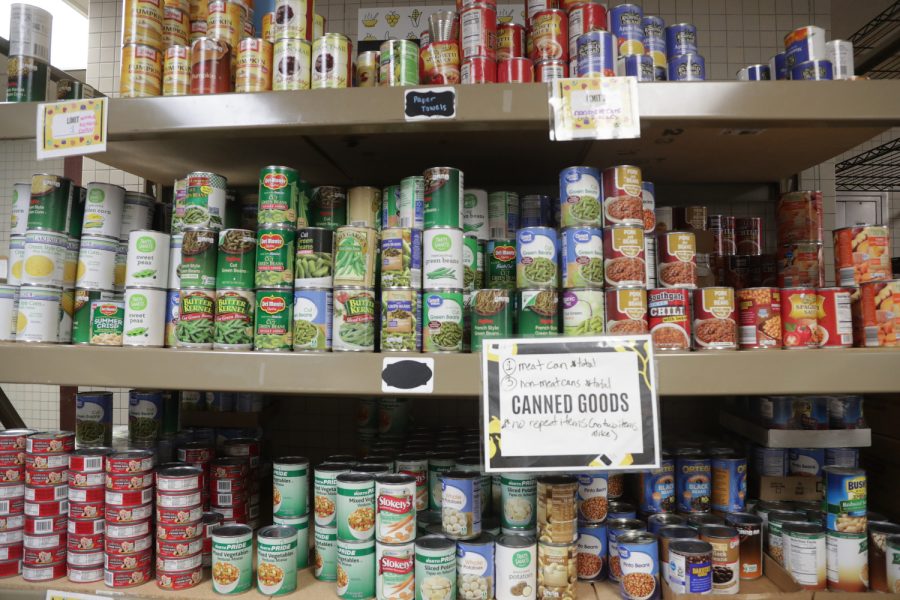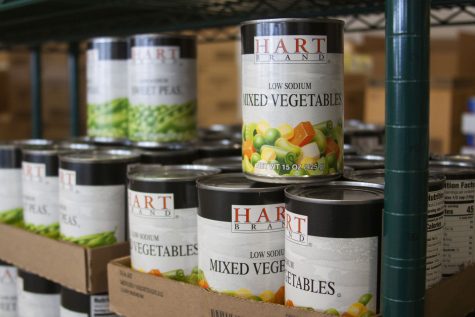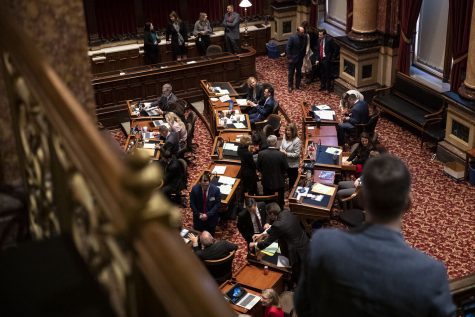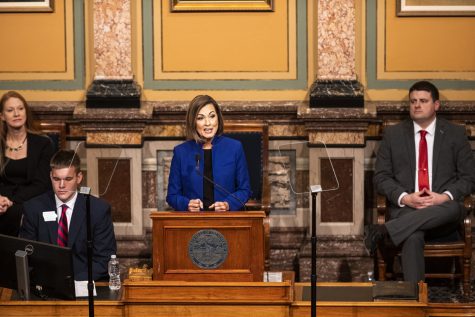Bill to change SNAP benefits moves to committee vote
The Republican bill would merge the WIC and SNAP program’s administration to decrease federal costs. Lawmakers have promised an amendment eliminating restrictions on food items, but none have been filed.
Canned goods are seen on the shelves at the Food Pantry in the Iowa Memorial Union in Iowa City on Friday, Jan. 27, 2023.
January 29, 2023
Iowans could see fewer food options eligible for food stamp benefits if a bill proposed by Iowa House Republicans is enacted into law.
An Iowa House committee is discussing legislation that would modify specific food and eligibility requirements for Iowa’s Supplemental Nutrition Assistance Program. The bill would consolidate SNAP with the Special Supplemental Nutrition Program for Women, Infants, and Children to save on administrative costs, thus restricting the purchase of certain food items not allowed under the state’s WIC program.
The WIC program prohibits the purchase of certain food items with benefits, including white grains, baked or refried beans, chili beans, fresh meat, and sliced, cubed, and American cheese. The bill in its current state has been recommended for passage by the subcommittee assigned to the bill. It passed 2-1, with the Democrat on the panel voting against the bill.
The chair of the subcommittee, Thomas Jeneary, a Republican from Le Mars, said the restrictions on food types would be eliminated from the bill, but no formal amendment has been introduced.
Opponents say the bill would limit access to food for many Iowans
Community advocates say these restrictions will limit food choices for Iowans. Christopher Ackman, Hawkeye Area Community Action Program’s communications and volunteer manager, said the bill would severely limit how Iowans can spend their benefits and drive an increase in food pantry traffic.
“Families who are low income are already having a tough time,” Ackman said in an interview with The Daily Iowan. “This kind of makes it tougher. By limiting the SNAP benefits, it also puts a strain on the whole economy as well.”
Rep. Beth Wessel-Kroeschell, a Democrat from Ames and a member of the subcommittee that discussed the bill, said imposing restrictions on what families can eat is wrong. Wessel-Kroeschell also said the main argument for changing the qualifications of the program is that it will save the state money.
“There’s not a good solid reason for me that we’re doing — except for public perception. There are people who think there’s way too many people on SNAP benefits, but that’s purely a perception problem,” Wessel-Kroeschell said.
CEO of Food Bank of Iowa Michelle Book said it is her guess that the reason politicians want to restrict SNAP is because they think it will encourage people to stay in the workforce.
Subcommittee met on Jan. 26, passed the bill 2-1, now heads to whole committee for consideration
Lawmakers discussed the proposed alignment of SNAP and WIC during the final subcommittee meeting on the bill Thursday morning. SNAP and WIC programs are both public welfare services, but WIC is meant to aid pregnant women, while SNAP benefits low-income households.
“That’s a program that’s specifically designed for pregnant mothers, and so they have some restrictive benefits and food items that they can get with those. And essentially, that’s the type of benefits that they are looking towards,” Ackman said. “So, there are foods that are not really sustainable for family. There will be that more choice in the category of benefits.”
Wessel-Kroeschell said WIC-approved foods are not enough to fit the nutritional needs of a family because WIC is targeted at pregnant women.
Iowa House Speaker Pat Grassley, a Republican from New Hartford, is one of the many sponsors of the bill and said the program is costing the state too much money to administer.
“Everyone wants to make this new ESA program look like the true threat to public education,” Grassley said to Iowa PBS. “If you want to look at a true budget impact on what things are really challenging in the budget for public education or private education, it’s these entitlement programs. They are the ones growing on the budget and putting pressure on us.”
States do not fund SNAP alone, rather they split the administrative costs with the federal government. In 2020, the federal government paid Iowa $20 million for the costs of SNAP. The state bears half the administrative burden for the program, according to state budget analysis.
In 2021, 9 percent, or around 286,100 Iowans, received SNAP benefits, and each household received an average of $212 in SNAP benefits.
Another part of the bill would impose asset limits on Iowans seeking or already receiving SNAP benefits. The cap for SNAP benefits eligibility is no more than $2,250 for a household and no more than $3,250 if a household contains a person who is 60 years and older or who has a disability.
Lawmakers explained this would only enforce current federal guidelines that Iowa hasn’t done in the past.
“This simply is working to knock people off of SNAP and not help them with, you know, the bottom line — what’s the real problem,” Wessel-Kroeschell said.
Wessel-Kroeschell said this bill will knock people off the program, meaning less money would be coming from the federal government to the state.
Ackman said the effects of changing Iowa’s SNAP benefits go beyond the choices made at the grocery store. Ackman said because many families use their SNAP benefits the minute they receive them, the program gives a boost to grocery stores, farmers, and local economies. Ackman said groups like the Hawkeye Area Community Action Program, which are nonprofits and not government agencies are at the mercy of political issues.
The bill is still in the legislative process but is likely to be considered and discussed at the next Health and Human Services committee meeting in the Iowa House.













